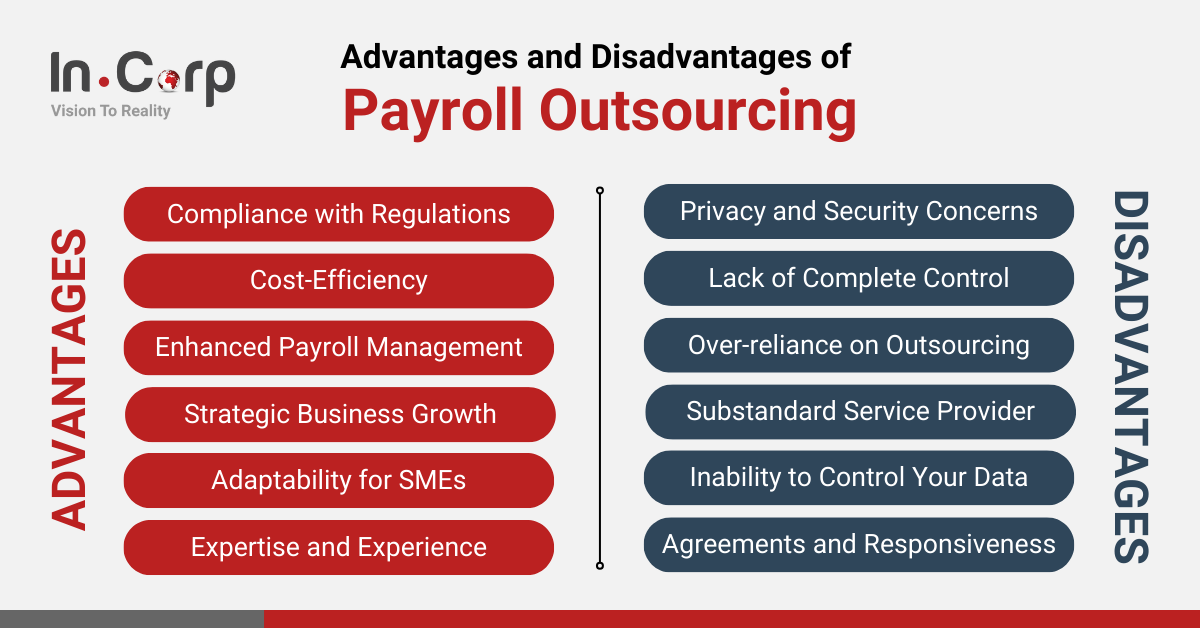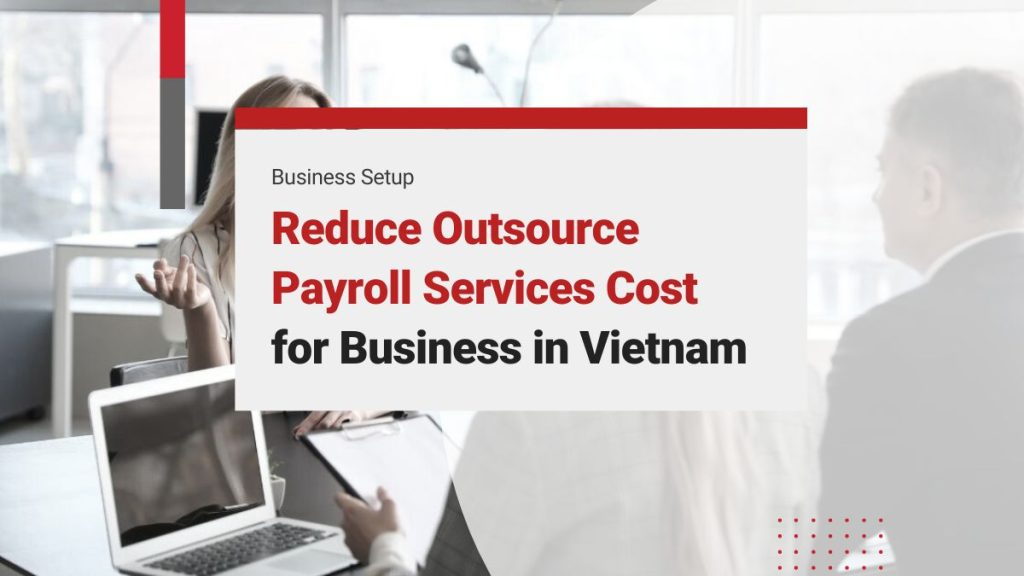The intricacies of payroll in Vietnam are a recurring nightmare for many businesses, with numerous pitfalls where errors can readily occur, potentially subjecting your enterprise to severe legal consequences. The magnitude of potential mistakes amplifies with the scale of your company and the diverse locations it operates in, underscoring the critical need for meticulous payroll management. For many companies, partnering with reliable HR and payroll consultants in Vietnam can significantly reduce such risks while ensuring smoother compliance with local regulations.
As businesses grow in Vietnam, so does the complexity of their operations, making it tough for startups and SMEs to manage everything in-house. Often, internal teams lack the specialized skills for detailed tasks like payroll and tax finalization, highlighting the need for external support to ensure efficiency and compliance.
Recognizing the need for expert help, businesses increasingly turn to outsourcing for critical operations like payroll, which requires monthly commitment and accuracy. This strategic choice helps avoid the pitfalls of mishandled payroll, such as employee dissatisfaction and legal issues with Vietnam’s complex tax laws, ensuring smoother business operations and compliance.
Definitions relevant to Payroll Outsourcing
What is Payroll?
Payroll transcends the simple act of mailing out paychecks; it involves a multifaceted range of tasks, not necessarily executed by a single entity. The process commences with the integration of employees into a payroll system and extends to encompass end-of-year tax responsibilities.
The intricate “functions” associated with payroll include the collection of employee information, establishment of automated payments and direct deposits, meticulous tracking of hours or timesheets, computation of owed wages, distribution of pay stubs, and, where necessary, wage garnishment as mandated by court orders. Additionally, payroll management extends to overseeing information crucial to the tax process, such as health insurance and workers’ compensation claims.
The term “payroll” serves a dual purpose, denoting both a company’s roster of employees slated for payment and the aggregate amount an employer is obligated to disburse in wages and salaries. However, in the contemporary business landscape, “payroll” predominantly refers to the process of compensating employees or the entities entrusted with executing this crucial function.
Importantly, this expense is typically deductible, serving as a means to reduce the company’s taxable income when deducted from the gross income. The dynamic nature of payroll costs is evident as they can vary from one pay period to another, influenced by factors like overtime, sick pay, and other variables. While manual payroll management may suffice for very small businesses with minimal staff, the norm for efficient operations involves the use of payroll software or the delegation of payroll responsibilities to professionals such as bookkeepers, accountants, or specialized payroll providers.
Accurate payroll processing is critical for employees, tax authorities, and business operations. It ensures employee satisfaction, complies with tax laws, and is a significant expense, especially for small businesses. Payroll for contractors, who have different payment structures, adds complexity to payroll management.
What is Outsourcing?
Throughout much of the 20th century, companies aspired to maintain ownership and control over every facet of their business functions and assets. Economic theories of that era advocated expansive growth in all feasible directions, emphasizing the exploitation of economies of scale. This inclination towards vertical integration was not limited to external assets but permeated into companies’ internal processes. The turning point arrived in the late 1980s when numerous companies, burdened by unwieldy internal structures, recognized the strategic benefits of outsourcing — the practice of contracting out work traditionally handled in-house. As the potential cost savings of outsourcing became increasingly evident, it ushered in a paradigm shift in business operations.
Outsourcing, the act of delegating specific business functions to external entities, is now acknowledged as a widely applicable business strategy. However, the ethical implications and the broader socioeconomic, political, and cultural consequences of outsourcing are often underestimated. While its immediate financial value as a short-term, cost-cutting measure has been significantly amplified by globalization, providing access to international labor at a more economical rate than the domestic workforce, the practice raises complex considerations that extend beyond its fiscal advantages.
What is Payroll Outsourcing?
In the initial phases of strategic outsourcing, companies typically opted to delegate low-skill tasks located at a distance from sensitive business areas. However, a paradigm shift has occurred recently, with many companies now choosing to outsource critical functions, such as customer service and money-management tasks. This shift extends to activities traditionally handled by administrators or human resources departments, including the pivotal task of payroll management.
Outsourcing payroll once considered risky due to its involvement with company funds and sensitive data, has become viable due to its predictable, guideline-driven tasks. This shift towards entrusting core and peripheral functions to outsourcing partners reflects increased confidence in their capabilities, marking the evolution of outsourcing strategies.
Payroll outsourcing involves hiring an external firm to manage all payroll functions, such as calculating salaries, handling taxes and deductions, submitting tax returns, managing direct deposits, and using payroll software. This allows businesses to focus on their core activities by reducing the administrative load of payroll management.
Beyond fundamental payroll functions, many outsourcing providers extend their services to include integrations with other essential business tools and systems. These integrations may encompass accounting software, time-tracking systems, and benefits management platforms, fostering seamless processes and facilitating the synchronization of financial data.
It is crucial to distinguish between payroll outsourcing and professional employer organizations (PEOs). While both handle payroll management, PEOs offer a more extensive array of HR services and function as co-employers, sharing responsibilities with the client company. PEOs often manage employee benefits administration, workers’ compensation, regulatory compliance assistance, and payroll processing.
Conversely, payroll outsourcing companies concentrate primarily on payroll functions and may not provide the same breadth or depth of HR solutions as PEOs. Understanding this distinction is essential for businesses seeking the most suitable outsourcing arrangement for their specific needs. The burgeoning demand for outsourcing services is mirrored by the growth of the payroll market. Projections indicate a substantial expansion, with the outsourced payroll market anticipated to increase by US$6.15 billion by 2025.
Read More: HR Outsourcing in Vietnam: Optimizing Operations for Business Success
Top Reasons for Payroll Outsourcing in Vietnam

Compliance with Evolving Regulations
Navigating Vietnam’s intricate regulations about labor, payroll, accounting, and tax reporting poses a formidable challenge for foreign companies. The dynamic nature of the country’s laws, influenced by rapid labor market growth and economic changes, adds complexity to payroll calculations.
Variables such as hourly rates, minimum wages, and overtime payments contribute to the intricacies. Businesses must remain vigilant as even a single misstep in payroll and tax reporting can result in significant penalties. Outsourcing to specialists, like InCorp Vietnam, equipped with a team of payroll experts, ensures precision, accuracy, and adherence to the latest legal nuances, safeguarding businesses from costly errors.
Read Related: Vietnam’s Workforce: High Demand Skills and Advice for Business in 2024
Cost-Efficiency
Recognizing that time is synonymous with money for business owners, the time-intensive nature of payroll tasks, including calculations, tax reporting, and paycheck distribution, can drain valuable resources. By comparing the time spent on these tasks with the costs of outsourcing, businesses realize substantial cost savings. Outsourcing liberates valuable time, allowing business owners to focus on core activities that directly contribute to revenue generation.
Enhanced Payroll Management
Payroll outsourcing elevates payroll management by providing comprehensive reports in an easily understandable format. InCorp Vietnam, as a trusted outsourcing expert, offers expertise in organizing payroll, accommodating changes seamlessly, and presenting information clearly and concisely. This ensures that businesses have access to streamlined and efficient payroll management tools.
Strategic Business Growth and Increased Productivity
Delegating time-consuming payroll tasks to outsourcing experts allows businesses to concentrate on their core competencies, fostering strategic business growth. Juggling numerous tasks can be distracting, hindering the effective implementation of essential strategies. By redirecting resources, skills, and knowledge toward core business activities, businesses can optimize productivity and witness substantial growth. Payroll outsourcing becomes a catalyst for businesses to stay true to their strengths and drive meaningful progress.
Looking for Payroll Outsourcing in Vietnam? Check out InCorp Vietnam’s Payroll Outsourcing Services
Adaptability for Small and Medium Enterprises (SMEs)
For SMEs in Vietnam, outsourcing payroll confers a high degree of adaptability, enabling swift adjustments to market changes and seamless management of various aspects related to employees and their payroll. This proves particularly crucial in industries with dynamic demands, such as software and marketing, where a rigid workforce may pose challenges.
SMEs can efficiently address fluctuations in demand by employing contractors and consultants, providing a flexible workforce to navigate seasonal and cyclical challenges. This approach not only ensures cost-effectiveness but also enhances stability and efficiency in managing labor resources.
Expertise and Experience
The primary responsibility of payroll outsourcing service providers is to organize accurate and timely salaries for employees. Beyond paychecks, they meticulously handle personal income tax (PIT) and employee insurance, encompassing Social, Health, and Unemployment Insurance (SHUI) – the three compulsory insurance types in Vietnam.
In addition to these essential functions, payroll outsourcing providers offer invaluable expertise and experience. This includes expert advice and consultation to navigate the intricacies of payroll and taxes, particularly beneficial for companies with a global presence.
Many foreign-owned companies operating in Vietnam face challenges due to administrative processes being primarily conducted in Vietnamese. A proficient outsourcing provider should deliver fully bilingual services, ensuring seamless communication and understanding between clients and authorities, thus overcoming language barriers and enhancing the overall efficiency of payroll processes.
Some Drawbacks Should Be Considered When Using Outsource Payroll Services
Privacy and Security Concerns
Companies contemplating outsourcing payroll may encounter apprehensions regarding privacy and security. The risk of identity theft and payroll data breaches is a valid concern, especially if service providers inadvertently disclose client information. Such events can jeopardize employee privacy, compromise security, and expose the company to potential reputational threats. Choosing a reputable and transparent service provider becomes paramount to alleviate these concerns and safeguard sensitive information.
Lack of Complete Control
The absence of complete control over payroll management is a notable drawback associated with outsourcing. Urgent modifications to specific payroll data, required outside the provider’s office hours, may entail waiting until the next day for resolution. While outsourcing may not offer the same level of flexibility as managing payroll in-house, it does present certain advantages, such as reduced time spent overseeing employee tasks. Setting autonomous goals for the service provider can mitigate concerns related to control.
Budget Constraints
Despite being a more cost-effective option compared to maintaining an in-house team, payroll outsourcing still incurs expenses. For SMEs in Vietnam operating on a limited budget, these costs may prove prohibitive. The financial feasibility of outsourcing should be carefully evaluated to ensure it aligns with the organization’s budgetary constraints.
Over-reliance on Outsourcing
Over-reliance on a payroll outsourcing provider can lead to challenges when the need arises to establish an in-house payroll department for business growth. The knowledge and skills required for internal management may need to be developed from scratch, posing a potential hurdle. To mitigate over-reliance, businesses should seek providers that prioritize client needs, offer transparency throughout their activities, and facilitate a smooth transition if the decision is made to bring payroll management in-house.
Substandard Service Provider
Entrusting payroll outsourcing to a substandard service provider poses significant risks to your business. It is crucial to conduct thorough due diligence before making a decision. Seek references, assess the provider’s qualifications, and scrutinize their processes. By diligently comparing various providers, you can make an informed choice and avoid potential pitfalls associated with inadequate service quality.
Inability to Control Your Data
When outsourcing payroll, you relinquish control over your data to the service provider, necessitating a careful review of the terms and conditions. Understanding where and how your sensitive payroll data is stored and utilized is paramount. Given the sensitivity of payroll data, security is paramount. Many cloud-based payroll software solutions offer multi-level authorization options, allowing you to manage, edit, and share data securely.
Service Agreements and Responsiveness
A critical aspect of outsourcing payroll is the establishment of service level agreements (SLAs). In the event of a payroll mistake, a subpar service provider may not respond promptly, potentially causing damage to your company’s reputation. Ensuring a clear understanding of SLAs and the provider’s responsiveness is essential. This clarity enables you to address potential issues swiftly, safeguarding your business interests and maintaining the integrity of your payroll processes.
Payroll in Vietnam: Common Errors
Mismatch Between Payroll and Accounting Records
The segregation of responsibilities between the HR and accounting teams can lead to discrepancies in payroll and accounting records. Varied interpretations and handling of figures may result in inconsistencies between the two sets of records. Establishing a standardized process within the organization is crucial to ensure alignment between HR and accounting records. Failure to reconcile these records may lead to errors and, subsequently, expose the company to serious penalties.
Exceeding Allowed Probation Duration
Vietnam stipulates a probation period of 30 days for most jobs and 60 days for positions requiring higher tertiary degrees. Prolonging probation periods beyond the specified duration is not permitted, as employees are automatically deemed to have entered into employment contracts. Any error in adhering to these regulations may lead to financial consequences for the business, including a maximum 15% reduction in salaries for employees under probation.
Issues with Gross and Net Salaries
Vietnam’s tax laws utilize gross salaries for employers, with withholding taxes and insurance calculations based on this figure. Using net salaries in employee contracts can complicate payroll calculations. Employers must align their salary structures with the requirements of Vietnamese tax regulations to avoid errors and ensure accurate payroll processing.
Failure to Update Insurance and Tax Rates
In Vietnam, changes in insurance rates, personal income tax rates, and minimum wages occur up to two times per year. Many companies in Vietnam rely on Microsoft Excel for payroll processing, and errors can arise when HR staff forget to manually update formulas due to changes in rates. Regularly updating these rates is essential to prevent miscalculations and maintain compliance with current regulations.
Tax on Benefits not Included in Payroll Calculations
Employee personal income tax extends to certain benefits provided by companies, and these should be factored into the payroll calculation. Failure to include such benefits, like covering the cost of a Vietnam visa for a foreign employee, in the payroll process can lead to implications. It’s crucial to accurately account for all taxable benefits to ensure compliance with personal income tax regulations.
Foreign Workers Without Work Permits
According to Vietnamese Labour Law, employing a foreigner without a work permit or a work permit exemption certificate is prohibited. Payments made to a foreigner without a valid work permit are non-tax deductible. Moreover, this violation can lead to severe consequences, including potential deportation for the foreign worker and significant penalties for the employer. Adhering to work permit regulations is essential to maintain tax compliance and avoid legal complications related to the employment of foreign workers in Vietnam.
Read Related: Vietnam’s Work Permit and Temporary Residence Card for Foreigners
Worried about payroll when doing business in Vietnam? Contact InCorp Vietnam’s Payroll Experts for more advice
Conclusion
Navigating the complexities of payroll management in Vietnam requires a meticulous approach, as evidenced by the common errors and challenges faced by businesses. Understanding the nuances of payroll outsourcing is crucial, with due diligence needed to avoid substandard service providers and ensure data security.
Moreover, specific challenges unique to Vietnam, like tax implications on benefits and stringent regulations on foreign workers, further emphasize the need for meticulous payroll management. A proactive stance, incorporating these insights and addressing potential pitfalls, positions businesses to streamline payroll processes, maintain compliance, and foster sustained growth in the dynamic business landscape of Vietnam.

clients worldwide

professional staff

incorporated entities in 10 years

compliance transactions yearly






